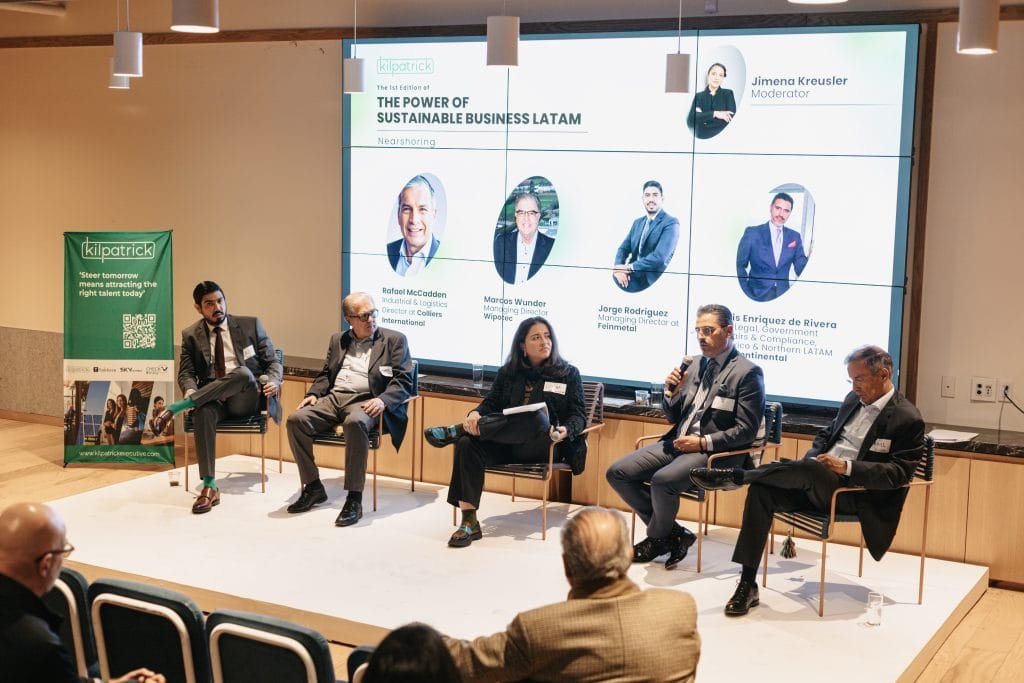As the hosts of “The Power of Sustainable Business Latam” event, we had the privilege of having two enlightening panel discussions that explored the nearshoring landscape and the energy transition in Mexico. The discussions provided valuable insights into Mexico’s potential as an expansion destination and its commitment to a greener and more sustainable future. This recap offers a comprehensive summary of the key points discussed during the event, providing valuable insights into Mexico’s industrial sector and its journey towards sustainability.
Nearshoring Opportunities and Challenges
The first panel focused on nearshoring opportunities, highlighting Mexico as an attractive destination for companies seeking expansion. Our esteemed panelists acknowledged the success of industrial hub Monterrey and the historical concentration of manufacturing activities in the northern region. However, we also discussed the challenges and perceived risks associated with competition from countries with lower labor costs. The scarcity of engineering talent in certain cities, such as Merida, and the importance of logistics and incentives were also deliberated upon. The profitability and selection process for new locations emerged as key considerations for businesses.
Government Affairs and Industrial Parks
In the second panel, we delved into the challenges of navigating government affairs and logistics in Mexico. Our panelists emphasized the shift towards engaging with individual states, highlighting the complexity of dealing with various regional authorities. We discussed the significance of transportation routes such as the NATA highway, as well as alternative modes of transportation like trains and air transport. The panel also shed light on the occupancy rates of industrial parks in Mexico and the challenges of finding suitable land and ensuring sufficient energy supply for projects within these parks.
Energy Transition and Sustainability
The energy transition panel emphasized the importance of creating favorable conditions to attract investments and accelerate the adoption of cleaner energy sources in Mexico. We recognized the significance of natural gas imports from the United States in meeting energy demands while reducing reliance on polluting sources. The development of hydrogen as an alternative energy source was also highlighted as a significant milestone in Mexico’s energy transition journey. Decentralization, digitalization, and government support through subsidies were identified as key factors in driving the adoption of renewable energy.
Collaboration and Education
Throughout both panel discussions, collaboration between businesses, consumers, and the government were emphasized as crucial for sustainable growth. We discussed the importance of building a diverse workforce, embracing cultural differences, and fostering effective communication for transnational companies. In the context of sustainability, we highlighted the need for education and awareness campaigns to promote recycling and sustainable practices. Notable initiatives, such as Tetra Pak’s efforts in the Dominican Republic, exemplified the dedication to sustainability. The concept of extended fiduciary responsibility was also highlighted, emphasizing the role of consumers and supportive regulations in driving sustainable choices.
“The Power of Sustainable Business Latam” event provided a platform to explore nearshoring opportunities and the energy transition in Mexico. The discussions revealed Mexico’s potential as an expansion destination and its commitment to sustainability. We acknowledged the challenges of logistics, talent availability, and navigating government affairs, while emphasizing the power of collaboration between businesses, consumers, and the government. By addressing these challenges together, Mexico can position itself as a promising destination for businesses while leading the way towards a greener and more sustainable economy.

